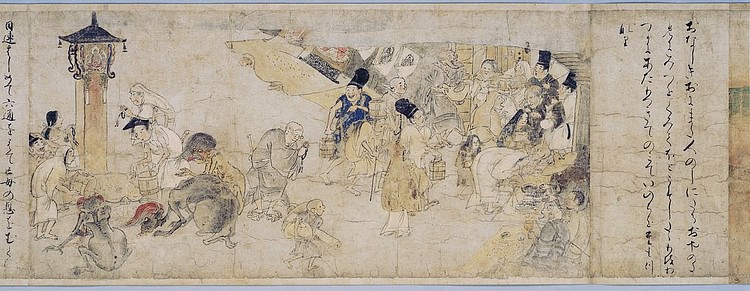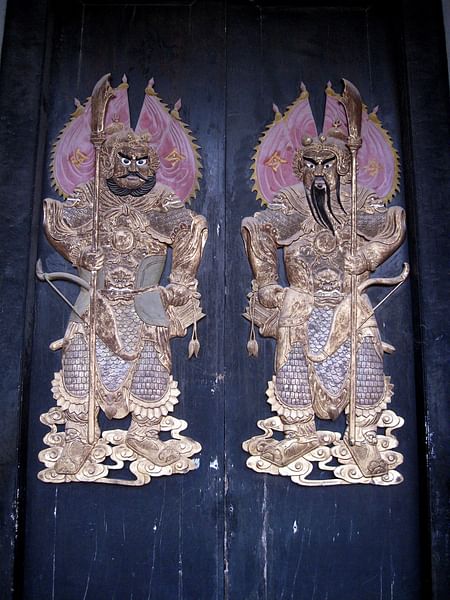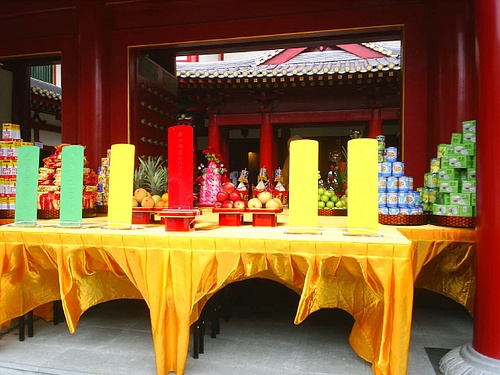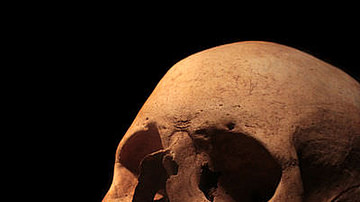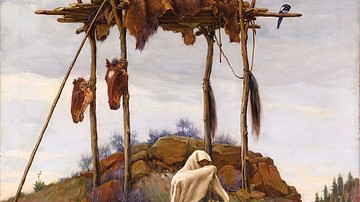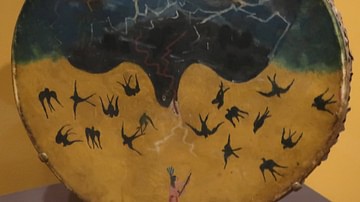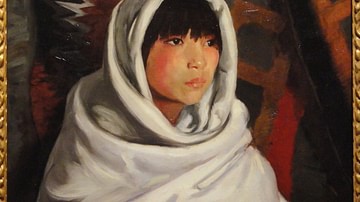Ghost stories were the earliest form of literature in ancient China. They were almost certainly part of a very old oral tradition before writing developed during the Shang Dynasty (1600-1046 BCE) and they continue to be popular in China today. Ghosts were taken very seriously by the ancient Chinese.
In modern-day China, ghosts only have power to harm if one believes in them, but in ancient China, they were a reality whether one believed in them or laughed them off. When a person died, their soul journeyed across a bridge to the afterlife. They were judged as worthy or unworthy on this crossing; if they had lived a good life, they continued on, or if they had done evil, they fell from the bridge into hell.
If they reached the other side, they were either reincarnated or went on to live with the gods, depending on one's beliefs. Buddhists, for example, believed that people were more often reincarnated, while Confucians believed that the ancestors dwelt with the gods and could be prayed to for assistance or protection. The first step in this journey after death was one's burial and funeral service, and if this was not done right, the soul of the deceased would return to earth to haunt the living.
The Importance of Proper Burial
In China, the ground under the earth was considered the property of the gods. Cemeteries were located outside of towns and cities in rural areas and there were earth spirits there known as Tudi Gong, as there were anywhere else. One could not just go and dig a grave without first honoring the gods and local spirits and purchasing the land from them.
The relatives of the deceased would choose a spot and then write up a legal contract purchasing that plot from the gods and spirits. This contract cited "the dead person's name, titles, and date of death; the exact dimensions of the plot, the price paid for the land...and signatures of witnesses" (Benn, 271). They placed the document in the grave and then honored it by paying a certain amount of cash. Since physical currency was of no use in the afterlife, people would purchase sheets of paper, cut out a certain amount of "bills" from it, write denominations on them, and burn them at the grave. Once all this was accomplished and signs were received that it was acceptable, the person could be buried.
Since it was hoped the dead person's soul would pass over the bridge to the land of the gods, grave goods were included in the burial, which consisted of favorite objects and food. The dead then had to be mourned for an appropriate amount of time. For parents and grandparents the minimum was three years during which one had to wear special mourning clothing, could not attend parties, listen to or play music, and, in the case of government positions, go to work. Government officials had to resign for three years when a parent or grandparent died, and failure to report a death to the authorities carried a penalty of exile or hard labor. These rules and many others applied to royalty as well as to the peasant class and if any of these steps were not done properly, or were ignored, the soul of the deceased would return to earth.
The Parts of the Soul
There were two parts to the soul: the po and the hun. The po was the yin aspect of the soul associated with darkness, water, and earth. Scholar Charles Benn writes:
It was the governor of the physical nature of man and gave form to the fetus in the womb. The po was the animal nature of man, instincts and urges that first became apparent after birth when the behavior of an infant was clearly centered on the fulfillment of its self-centered needs. (276-277)
The hun was the yang aspect of the soul associated with light, fire, and the heavens. Benn writes, "It governed the intelligence of man. At birth it was weak, but evolved and strengthened as the child's reason developed, especially after the age of six, when education began. It reached full maturity at the age of twenty, but did not fully perfect itself until the age of fifty" (278). These two parts of the soul worked together to make life possible for a person. The hun (reason) governed the po (instinct) but the hun needed the po in order to survive. After death, these two aspects could return to cause problems for the living if proper burial rites had not been observed or for other reasons such as unfinished business, a vow taken, to right a wrong, or just to visit.
Po & Hun Hauntings
Stories of ghosts haunting a house where they once lived, haunting relatives, or appearing to strangers for help are all examples of po hauntings. The yin spirit is still attached to the earth because proper rituals were not observed to release it.
One of the best-known stories of this type is about the ghost of a young girl who visits the home of some brothers. The spirit was so irritating they caught it, put it in a bag, and threw it down a well. The next night it came back carrying the bag and haunted them again. They stuffed it back into the bag, tied a rock to it, and threw it in the river. The next night, though, the little girl came back and, this time, the brothers put her into a hollowed-out log, which they capped on each end, and set adrift on the river. The spirit thanked them for a proper burial and never bothered them again.
Hun hauntings were different because the hun was not as attached to the body. Stories about spiritual possession, ghosts appearing as though they were still living, or ghosts taking revenge on the living are examples of hun hauntings. Since the hun was the rational part of a person, their personality, it was also thought to be the part of the person affected by illness in life, and the "astral self" who would appear to others in dreams after death.
Charles Benn gives examples of these kinds of stories citing one where a teacher named Tan fell ill and began to die. In a dream, he saw a figure standing in a robe telling him, "I am returning your soul to you" and throwing orange robes at him. The next morning he recovered from the sickness" (278). The orange robes symbolized the "clothing" of the soul, the unique aspect of it, which was the hun.
In another story, two friends, Gao and Liu, make a pact that whoever died first would return to tell the other what the afterlife is like. Some months after Liu died, Gao heard a knock at his door one night and the voice of his friend requesting he douse his lamps and let him in so they could speak in the dark. As they were talking, Gao was disturbed by the smell of a rotting corpse and found that Liu's hun had possessed the body of a barbarian who had been dead seven days.
Another tale, emphasizing the importance of keeping one's word, tells of Marshal Li who wanted to marry a young girl but was refused by her mother. Li had to have her, though, and he vowed he would never marry if he could not marry her. He proved himself so devoted and persistent that the mother let him marry her daughter, and he swore to be faithful forever. After a few years, the girl died and only one year later Li arranged to marry someone else.
Just before his marriage, when he was soaking in his bath, the hun of his first wife appeared, reminding him how he had promised that he would never marry anyone else. She sprinkled herbs into his bath and vanished. Li began to feel soft and weak and so bloated he could not move. He died in the bathtub and when he was found his bones and tendons had dissolved (Benn, 280). In addition to the importance of keeping one's word, this tale emphasized how one should always observe a proper period of mourning.
Types of Ghosts
The po and the hun, when they returned to haunt the living, were generally known as guei (also as kuei, kui, or gui). Improper burial was the chief reason for their return but they could also seek revenge or ask for help in righting a wrong they had done or one which they had suffered. In one story, the mother of a man died and, even after all the proper rituals were observed at her burial, returned to haunt him. In this case, grave robbers had broken into her tomb and defiled her body and she needed her son to apprehend and punish them. After he did as she asked, she was not seen again.
A particularly dangerous ghost was the shui gui (water ghost) which was the spirit of someone who drowned and whose body was never recovered or honored with a proper burial. The shui gui haunted the waters where they died and lured people in to drown them. After their victim was dead, the shui gui could move on but the victim's spirit took its place and waited for the next person who could be caught off-guard. Talismans and amulets were worn to protect one from a shui gui when going near water or swimming.
The jiangshi was a kind of zombie ghost (the name means "stiff body") who steals the breath from a person. Benn writes how "the Chinese believed that breath, qi, was the vital energy on which life depended" and these spirits sought to steal that away for themselves (265). The jiangshi would continue to pursue a person until their breath was taken, but because this spirit was already in the land of the dead, it could not return to life, and because it continued stealing the breath of life from others, it could not move on. Jiangshi are also known as "hopping ghosts" because their spirit bodies are so stiff they seem to hop instead of walk. They are predatory ghosts who had to be warded off by charms and spells.
Belief in this type of ghost especially, but also others, had a significant impact on Chinese culture as seen in a number of aspects. The false front or "shadow wall" just outside the front doors of Chinese houses originated to fool such ghosts who would be unable to find the actual front door. Ghosts, and especially the jiangshi, were thought to only be able to travel in straight lines, and this is why roads in China are always curvy: so that the ghosts cannot haunt them. Accidents on roads in China are frequently attributed to ghosts. Drivers will claim that a ghost stepped in front of their car, and they swerved to avoid it.
The protector gods known as menshen were also invoked. The menshen were the gods of peaceful sleep who were often painted on either side of a doorway to guard against evil demons or ghosts. Dogs were a great protection against ghosts of all kinds but especially the jiangshi. Dogs were once killed and buried in front of a house so their spirit could ward off ghosts. Eventually, people began using straw dogs for this, and that evolved into the use of dog statues. Even in modern-day China one will find dog statues outside the front door of a home.
Human beings were not the only creatures who had souls which could return or demand justice from beyond the grave; dogs and cats and other animals could as well. In one famous story, a man named Coffin Head Li was a bully who killed cats and dogs. One day he was approached by two men who identified themselves as ghosts and told him that a case had been made against him in the afterlife by the souls of 460 cats and dogs. Coffin Head Li was found guilty and taken away.
Another type of ghost was the nu gui, the spirit of a woman who was abused in life and, usually, murdered. She haunted the house or place where she was killed, seeking justice. The nu gui could act like a succubus and draw the hun aspect from the soul of men, killing them. They would only scare women but always killed men.
There were also the kuei-shen (nature demons) who were spirits of the earth. These were not necessarily the same kind of spirit as the Tudi Gong (earth spirits). Kuei-shen spirits were like the Tudi Gong because they had never been human beings and were immortal but they were not bound to a specific place and they were usually thought to be mischievous or evil. They were not considered as bad as the oni though.
The oni were evil spirits who could possess a person, lead a person astray, possess a home, and bring all kinds of troubles to people. Oni may have been human beings once or may be eternal spirits. One example of an oni is the spirit-type known as ba jiao gui. This is the spirit of a person who was addicted to gambling in life and dies (or commits suicide) before paying off debts. The person then becomes a ba jiao gui, an extremely ugly spirit, who haunts others.
The most famous type of ghost in China is the hungry ghost. This type emerged sometime after the first century CE when Buddhism came to China and was originally a Buddhist belief in India. Hungry ghosts are the spirits of people who always wanted more than they had, were never grateful for what they were given, and could not find peace in the afterlife any more than they could when they lived. They are often depicted as people with enormous stomachs but tiny mouths and necks which no amount of food could ever fill. Hungry ghosts can appear as living people to ask for food and, if one does not give them any, they can curse the person and bring disaster on one's home and loved ones. The term "hungry ghosts" always applies to this type of spirit but all ghosts were thought to be hungry in the afterlife and rituals developed to keep them fed and happy.
Views of Ghosts & Practices
The reality of ghosts like these gave rise to practices and rituals to protect people from them. The best defense against such ghosts was to live an exemplary life, and this was why ghost stories were (and are) so often told to children: they express cultural values and encourage people to be kind and courteous to each other. If one did not want to be killed by a nu gui one day, one should not abuse women who would become one, nor should one let one's self be abused.
If one went swimming, one should be careful of safety so as not to drown and become a shui gui. Proper respect should be given to one's elders, superiors, and ancestors in life so that they would not feel wronged after death and one should always keep one's word to others. Most importantly, proper burial practices should always be observed, no matter how much cost or trouble they required.
A ritual still observed in China today is Tomb Sweeping Day during the Qingming Festival which usually falls around the 4th of April. Even if one has neglected the graves of one's parents, relatives, or friends all year, one will go tend those graves on Tomb Sweeping Day and pay respects. The Ghost Festival is also still observed. This celebration, also known as The Hungry Ghost Festival, appeases the souls of the dead so they will not bother the living. This takes place during Ghost Month in China on the fifteenth day of the seventh month (in 2016 it will fall on 17 August) when it is thought that the curtain between the land of the dead and the land of the living is drawn aside and the dead can cross back over.
Celebrations and Rituals of Ghost Month
There are a great many rituals and taboos one must keep in mind during Ghost Month and especially during the festival. One should not sit in the front rows at the theater because those are the seats the ghosts want and they will be offended. One should not place one's shoes or sandals facing the bed because ghosts will take that as an invitation to sleep with the person. One should not stay out too late or a ghost may follow one home (this is most often said by parents to their teenage children). No one should go swimming because the shui gui are stronger and more numerous during this time. Any kind of home renovation or construction should be avoided because the noise bothers the ghosts, and this also goes for wearing high-heeled shoes. Women wearing high heels run the risk of being possessed by an angry spirit. Freshly washed clothes should not be hung up toward evening because ghosts will try them on, and this brings bad luck to whoever wears them next.
The taboos go on and cover almost any kind of circumstance one could imagine from not urinating outside (because one might be "going on" someone one cannot see) to leaving an umbrella open on one's porch (because a ghost may decide to rest under it and then take up residence). These rituals have a very long history and were observed as much as they could be even during the time when the Communist Party of China banned religion and religious practices c. 1949-1979 CE.
Celebrations of the Ghost Festival include public altars and parades where food is thrown into the air. The ghosts are thought to be hungry and so food is provided for them in homes and also in public places. Altars of fresh fruit and sweet cakes are set up on city streets and town squares. In the past, and still in the present day, incense is burned in front of homes in remembrance of one's ancestors and to give a pleasing scent to the spirits as they walk by.

Many shops in towns, and even cities, close during the festival so that the ghosts will not be disturbed by living shoppers. As the festival ends, people light small lotus lanterns which they place on paper boats and send off on the water of streams, lakes, or rivers. The lanterns let the ghosts know that their time of visiting with the living is over and they have to return to the underworld. The ghosts are thought to be attracted by the lanterns and will follow them back home to the afterlife. When the lantern goes out, it is a sign that the ghost following it has reached the other side and is at peace.

